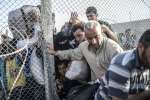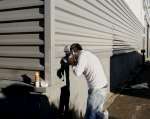UNHCR welcomes additional support to refugees, and calls for fast implementation and additional measures
Press Releases, 24 September 2015
UNHCR welcomes the announcements by the European Council to significantly increase resources for humanitarian assistance in neighbouring countries to Syria as well as the Justice and Home Affairs Council decision to relocate an additional 120,000 people.
"The relocation plan will not put an end to the problem, but it hopefully will be the beginning of a solution," said António Guterres, UN High Commissioner for Refugees. "It is an important step toward stabilizing the crisis, but much more needs to be done. The plan can only work if, at entry points in Europe, robust facilities are created to receive, assist, register and screen people. These facilities must have a capacity that could handle the current average 5000 people arriving every day by boat. They must also offer those in need of international protection a credible alternative to the present chaotic journeys across border after border at the mercy of criminal smugglers." The programme, which is limited compared with the present needs, must be quickly implemented. In order for the system to work, effective support for the dignified return of those that do not require international protection must also be in place.
UNHCR also welcomes the announcement that critically needed new funding would be made available for refugees in first countries of asylum. "So many refugee emergencies in the Middle East and Africa are woefully underfunded, leaving refugees in conditions so dire that many chose to move on," Mr. Guterres said. "People will continue to seek safety and survival further afield if the root causes of forced displacement are not addressed."
In relation to strengthening border control at the EU external border, UNHCR insists that the management of borders needs to be consistent with national, EU and international law, including guaranteeing the right to seek asylum.
UNHCR is disappointed that, notwithstanding relocation, no further measures have been proposed to create more legal pathways for refugees to reach safety in Europe. UNHCR urges a substantial and rapid increase in legal opportunities for refugees to access the EU, including enhanced resettlement and humanitarian admission, family reunification, private sponsorship, and humanitarian and student visas. According to UNHCR's assessment, 1 in 10 Syrian refugees are in need of resettlement – a total of 400,000 Syrian refugees. The international community as a whole should adopt the type of exceptional response which had been used in other humanitarian crises. Without such avenues, refugees will continue to be left with few options, and the increase in international efforts to crack down on smugglers and traffickers is unlikely to be effective.
UNHCR has stepped up its operations in countries affected by the current refugee flows and is ready to fully support all measures by the European Union and Member States, and other stakeholders, in effectively responding to the present crisis.
News contacts:
- UNHCR Headquarters, Switzerland
- Melissa Fleming: +41 79 557 9122
- Adrian Edwards: +41 79 557 9120
- William Spindler: +41 79 217 3011










































